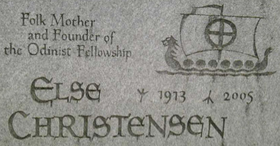
This month, we raise a horn to the Folkmother Else Christensen. As a young girl growing up in Denmark, she felt the call of our ancient ways. As a young woman, she became interested in the future of her folk. Else worked to lay the groundwork for a society that she believed would act in the best interest of her people. This would lead to many hardships while living in Europe during the early 20th century. Else found herself, her husband, and many peers under harsh scrutiny. This scrutiny then lead to personal hardship, including arrests.
Else carried her goals and dreams for her people across the ocean when she and her husband left Europe for Canada. There she encountered the works of Alexander Rudd Mills. From these works, she began to focus on the return of the Germanic pantheon to the hearts of the European peoples. She found further inspiration in the works of Francis Yockey and Oswald Spengler. While she agreed with their consensus that the European folk-soul was in a state of disrepair and decline, Else also believed that there was hope to be found. This hope was in the practice of Odinism. The very roots of this faith, she believed, were nestled with the spiritual DNA of the people themselves, and were part of their natural state.
In 1969, this vision blossomed into the founding of the Odinist Fellowship. This organization began to connect more and more followers of the old ways together, building a network across the globe. Else reached out to those in prison, and provided them with the materials to build themselves. She is a vital part of what we have built ourselves up to today. It would be difficult to imagine what we would be left to work with if not for her unrelenting perseverance.
Else died in 2005, working to build the Folk until the very end. Her legacy is in the communities that we have, the networks, and the Folk.
Hail Else Christensen!
Gythia Anna Funk